A Stolen Rose.
A Swedish immigrant soldier's life, and death, in World War I.
-
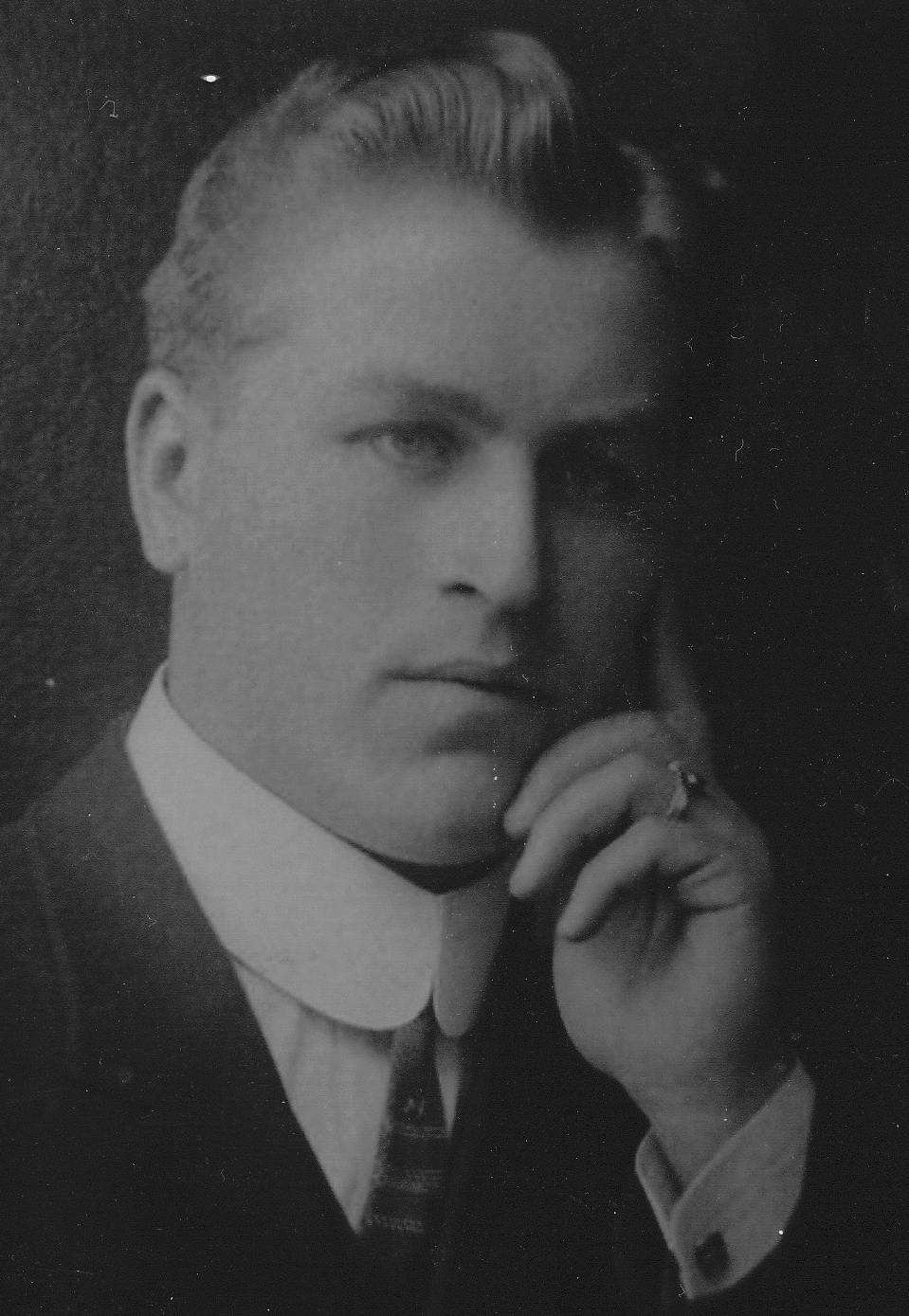 Klas E. Nygren.
Klas E. Nygren. -
-
A Stolen Rose
A Swedish immigrant soldier's life, and death, in WWI -
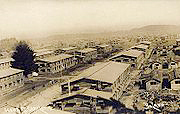 Fort Lewis, Washington, in 1917.
Fort Lewis, Washington, in 1917. -
-
Prelude...
On a volè la rose,
La rose de Picardie,
La fleur de Brocèliande,
La rose de legende.
On a volè la rose,
Notre meilleure amie. -
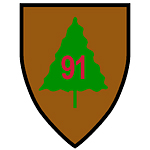 91st Division Arm Insignia.
91st Division Arm Insignia. -
[One has stolen our rose,
the rose of Picardy,
the flower,
the rose,
our best friend”]
Music Haydn Wood (1882-1959), popular song “Roses of Picardy”, sung by the soldiers in France and Flanders during WWI. -
 Campaign Streamer Meuse-Argonne.
Campaign Streamer Meuse-Argonne. -
This is a story in remembrance of a Swedish immigrant soldier's life that ended in the battle at Meuse-Argonne, France.
-
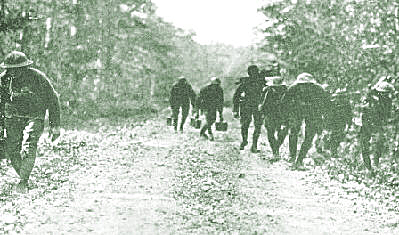 Advance in Meuse-Argonne.
Advance in Meuse-Argonne. -
I am Ingeborg Dean of Portland, Oregon and this is the story about my great uncle, Klas Edward Nygren. He was one of the unfortunate 14,000 soldiers that died in the dreadful killing fields at Meuse-Argonne in 1918.
-
 American Cemetery in the Argonne Forest.
American Cemetery in the Argonne Forest. -
On November 22, 1918, a telegram was received by my great aunt, Alma (Nygren) Janisch in Portland, Oregon. It informed her that her brother Klas Edward Nygren, had been killed in France on September 29 of that year.
In my family, the life of Great Uncle Klas was always described in just a sentence or two: “Uncle Klas immigrated to America, was called up for WWI and was killed right away.” As a child, I would look at his picture, intrigued.
I remember my father telling me that Aunt Alma left for America and settled in Portland, Oregon, and that her husband was an immigrant from Bohemia. However, I had no record of her last name to help me trace her family here in the USA. Then, some months ago I found a copy of a letter that Alma wrote in 1919 to her mother and brother Johan (my paternal grandfather) in Sweden—it was signed Alma Janisch! This meant that I could now begin to look for possible relatives here in Portland. It also enabled me to get a fuller picture of my great uncle Klas Nygren.
There was a copy of a letter from him as well, written in Portland on September 1, 1917. Klas Nygren was born in Årby in Dalarna, Sweden, on March 18, 1887, and immigrated to America in 1910. His destination was Worcester, Massachusetts, where he had a brother. In late 1917 he arrived in Portland, Oregon, to visit with his sister, who had left Sweden in 1896. Perhaps for some months Klas went to work in the Janisch family's dyeing and cleaning business on NE Knott Street. He writes touchingly about seeing his sister after 21 years, about their tears and joy and sharing news and memories.
At some point Klas, then 30 years old and unmarried, was called up as the U.S. entered WWI. He joined the 361 Infantry Regiment, 91st Division, also called the “Wild West" Division, as a private from the state of Massachusetts. On August 22, 1918, he wrote in a letter to his sister of having drills practically day and night. Alma had a feeling that he had not yet gone off to war.
The 91st Division was activated in 1917, under Major General H. A. Greene, mainly by young men from Oregon and Washington. The division was stationed at Fort Lewis in Washington State. The 361 Infantry regiment entered into the battle zone in late 1918, and to illustrate the carnage that took place, the 91st Division lost 3,000 soldiers, eight field and 125 company officers during four days of battle before they regrouped.
Three months later his sister Alma received a telegram from the U.S. Army with the devastating news of Klas’ death in the battlefield. Her subsequent letter to Sweden ends: “You ask how Klas felt when he left me for the last time. Well, he came to see me on June 22, in the morning and said, “Alma, I have come to see you one more time. I don’t think we will see each other again. I am leaving for France.” Alma wrote that she never forgot his words.” Klas thought about how this news would affect his mother. “Poor mamma when she finds out where I am!” He knew how difficult it would be for her.
Alma’s letter includes a lengthy discussion of how to deal with the expected monetary compensation that Klas had intended for his mother to receive in case of his death. The disbursement by the U.S. Army was $64.90!
Alma told her family in Sweden that she decided not to have her brother’s remains returned for burial in Portland. “People tell me not to do it, since we can’t see him and so can’t be sure it’s really Klas.” The French government assured her of the grave's location and that it would be well taken care of. She sent this information to her brother in Worcester. -
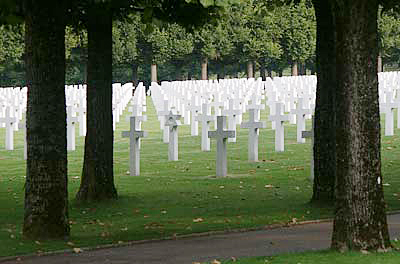 American cemetery in Romagne.
American cemetery in Romagne. -
91 years later...
I am in Beauvais, France, and today I visited my great uncle’s grave, the first member of his family to do so, and an occasion of great meaning to me! After almost a century, Klas Nygren is no longer just a name and date of death on a cross in the vast American cemetery in Romagne, France.
Family was there, moved by the unbearable and wasteful loss of life and of 14,245 others, most of them dead in the unimaginable horrific battle of Meuse-Argonne, September 25 to November 11, 1918. The grave markers fill some 100 acres near where they fought and died. Now large beech trees and well kept grassy walks separate eights plots, lettered A to H. Uncle Klas lies in plot H, row 34, grave 30.
There is a memorial, a chapel, a fountain and a Wall of Remembrance with the names of the missing—dignified and serene surroundings for those who perished, among them my uncle Klas, who came to America, no doubt with dreams of a better future. Instead he had to go to war for his chosen country and, tragically, lost his life. As I searched for his grave I noticed the names of many other young Swedes, who shared his fate. -
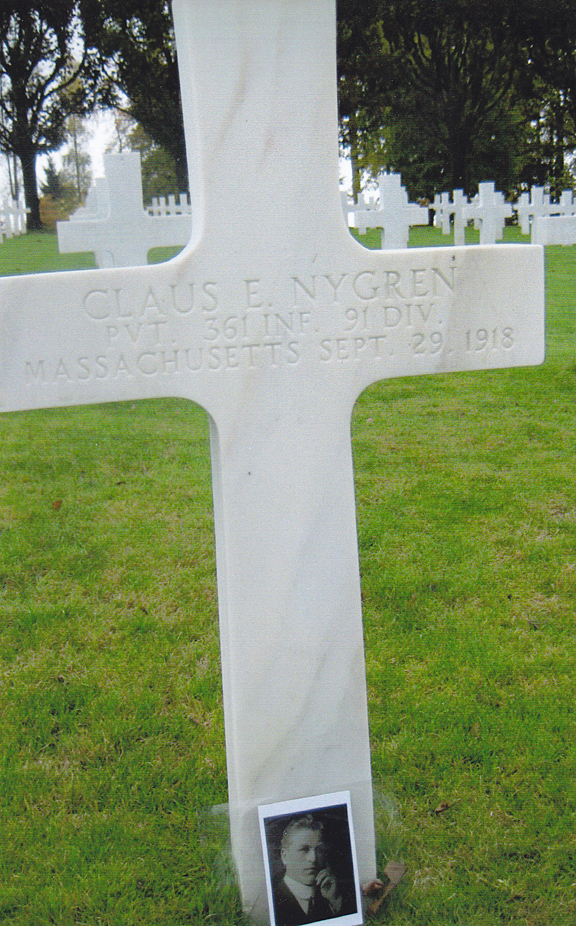 Nygren, PVT Claus E. 9233793 Meuse-Argonne American Cemetery; b. unknown d. Sep. 29, 1918 (captured from cemetery database of buried soldiers)
Nygren, PVT Claus E. 9233793 Meuse-Argonne American Cemetery; b. unknown d. Sep. 29, 1918 (captured from cemetery database of buried soldiers) -
Epilogue...
In times like today, when we are living our busy lives, it’s very important that we don’t forget the lost loved ones, and don’t allow their names, like Klas E. Nygren’s, to fade into the shadows of lost memories. -
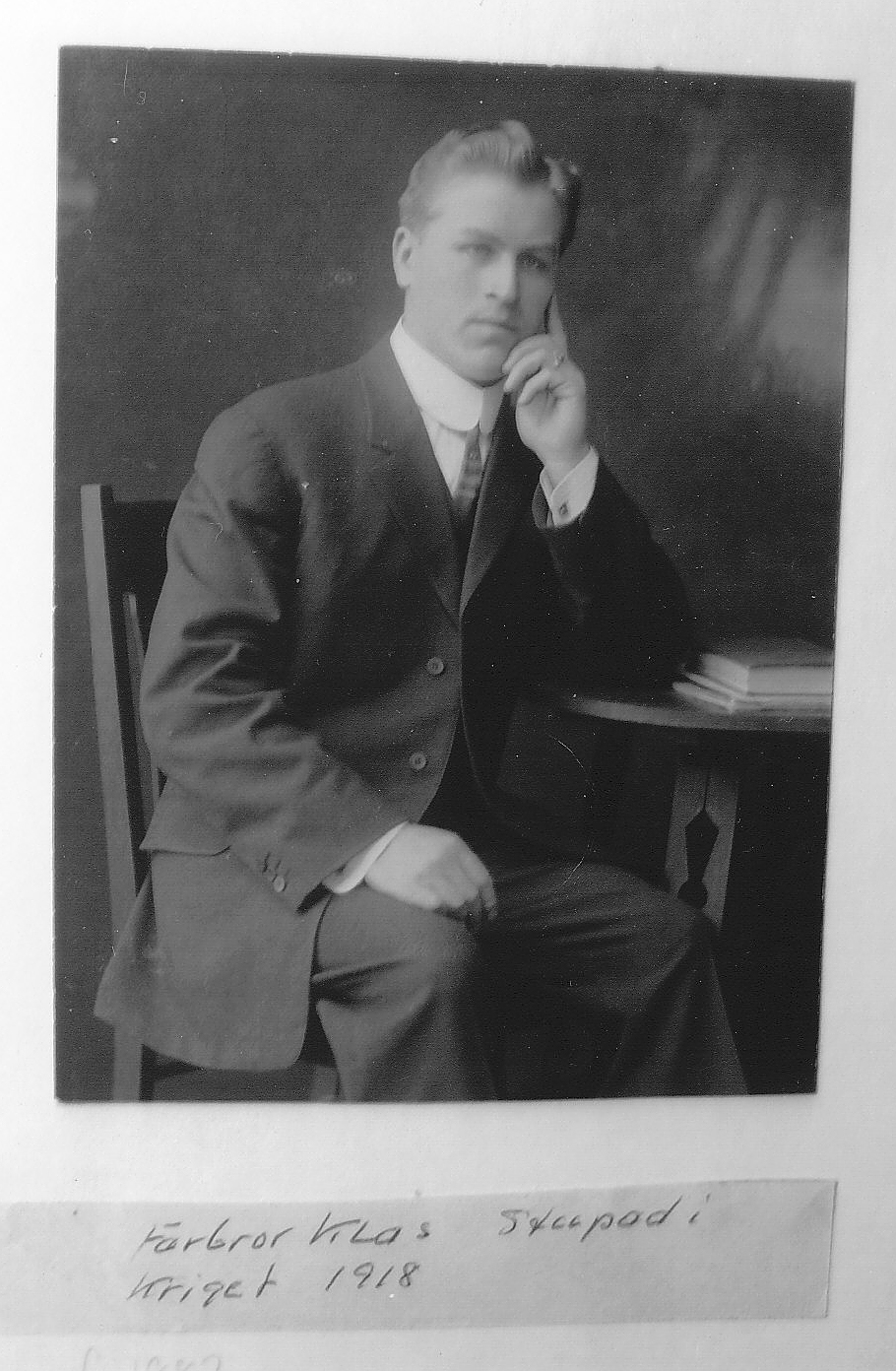 Klas E. Nygren.
Klas E. Nygren. -
Vid vägens slut (Verner von Heidenstam)
Vis, o människa, det blir du först,
när du hinner till de aftonsvala
höjders topp, där jorden överskådas.
Konung, vänd dig om vid vägens slut,
vila där en stund och se tillbaka!
Allt förklaras där och allt försonas,
och din ungdoms riken hägra åter,
strödda än med ljus och morgondagg. -
Story written by Leif Rosqvist, editor of New Sweden Heritage Society and SRIO newsletters. The story is based on information by the family here represented by Ingeborg Dean.
-
Further reading:
Full text of "Meuse-Argonne battle (Sept. 26 - Nov. 11, 1918)," go to Google and type in the text.
American Cemetery Meuse-Argonne in Romagne, go to Google and type in text under search
Fort Lewis and 91st Division, 361 Infantry Regiment, go to Google and type in text under search
Verner von Heidenstam, go to Google and type in text under search -
-
